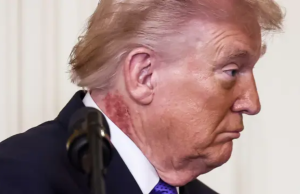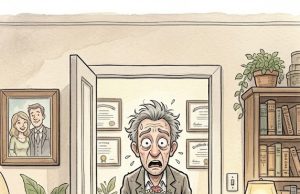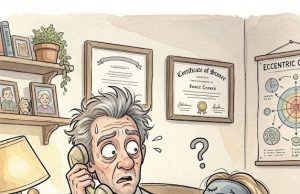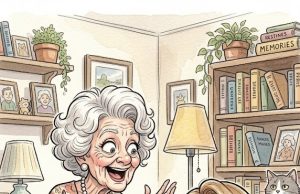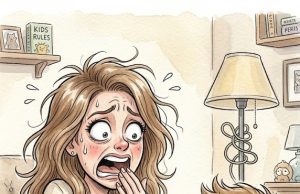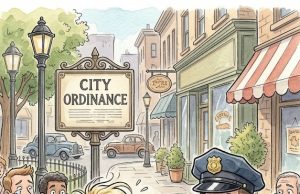
Katerina Melnikova worked as a school nurse at Gymnasium No. 27 for nine years. She was forty-one years old. This lovely, smiling woman with a warm, quiet voice possessed the uncommon capacity to be both empathetic and firm, especially when it came to children.
Her workplace was more than just a first-aid station; it was a space where the sterility of pharmaceutical odors did not interfere with comfort. Colorful health signs hung on the walls, soft toys stood in the corner for frightened children, and a change of clothes was always available in the drawers – in case someone got wet or tore their trousers.

The children adored her. The teachers trusted her. Katerina observed things that others did not: a slight twitch in the corner of the eye, a sudden shift in mood, and dark bags under the eyelids. She always drew conclusions. And she always acted.
A heat wave struck the city unexpectedly on May 1st. After a long, chilly spring, the thermometer rose to thirty degrees. Children ran to school in T-shirts and shorts, happy, tanned, and full of excitement.
But one of the children looked unusual.
Timur Grachev is a first-grader with large eyes and a unique, almost mature earnestness. His stare was intense, as if he knew more than his age. While conducting a medical examination in the corridor, Katerina spotted him wearing long sleeves, thick trousers, and a blue winter hat he had been wearing since the beginning of the year. The exact same one. Even in the steamy schoolroom, it remained on his head, drawn tight almost to his brow.
“Timur,” she whispered softly as he entered the office, “maybe you should remove your hat? It is really warm today…”
The child tightened up like a string. He clutched the brim of his hat with both hands and muttered:
– No… I need to wear it.
Katerina didn’t insist, but something inside her skipped a beat. He didn’t have a cold. He wasn’t shivering. He looked as if his hat was his last shield. As if he would be too vulnerable without it.

The examination was silent, but the nurse couldn’t help but notice how Timur winced every time the hat moved slightly. As if its edges were causing pain. Later, at lunch, Katerina finally asked his teacher, Svetlana Alekseyevna Lapina, a young, attentive woman with a quiet voice and kind eyes.
“Yes, I’m worried too,” she admitted, stirring her coffee with a spoon. “He doesn’t even take it off during gym class. He had a fit about it once in April. We don’t require it anymore.”
– And when did he start wearing it?
– After spring break. Never worn before.
After a pause, Katerina asked cautiously:
– What do you know about his family?
— Two years ago, my mother passed from canc3r. Only my father and older brother remain. My father is tough; he attended parent-teacher meetings and mainly discussed discipline. My brother picks Timur up from school. The youngster himself is very quiet and does not communicate with his peers. He simply disappears amid others.
Katerina’s suspicions increased. Of course, youngsters frequently become attracted to objects. However, there was something more going on here. Pain. Fear. Withdrawal. Over the course of a week, she began to follow Timur during breaks, in the cafeteria, and down the halls. His cap never left his head. His sleeve was always down. He appeared closed-off, as if he was terrified of being recognized.
Then one day she spotted a dark mark on the back of her hat. Blood. Her heart fell. Katerina was confident after reviewing Timur’s medical records that he had suffered no head traumas.
On Friday, she called her father.
– Hello, my name is Katerina Melnikova, and I am the school nurse. I wanted to discuss why Timur maintains wearing a winter hat…
“He knows he must,” the man said quickly.
– The temperature is almost 30 degrees. Perhaps there are some skin issues. Allergies?
Pause.
– It’s a family matter. None of your business. If that’s all?
– I also noticed a stain on the hat. Possibly blood. Was there any damage?
– Minor abrasions happen. We’ll sort it out at home. No need for unnecessary things.
He hung up.
On Monday morning, Svetlana Alekseyevna came to the medical center before classes began. Her face was worried:
– Timur is in class now. His head hurts, he’s almost crying. But he won’t let me take off his hat. No way.
Katerina took the first aid kit.

In the classroom, Timur sat in the corner, all huddled up, his hands pressed to his head. When he saw adults, he tried to straighten up and make his face neutral – too mature a gesture for a seven-year-old.
“Can I check your forehead? Just your forehead. I won’t touch your hat,” Katerina suggested.
He nodded. His forehead was burning, his body was shaking. Under his hat was a familiar smell: pus. Infection.
– Timur, I need to take off my hat. I’m afraid you have an inflammation. We’ll do it together, just you and me. Okay?
He froze.
– Dad said it’s not allowed. He’ll get angry. And my brother said that if they find out, they’ll take me away. It’ll be my fault.
“It’s not your fault,” Svetlana said softly. “You’re not guilty of anything.”
Having closed the door of the medical center, Katerina took out gloves, antiseptic, bandages. She slowly explained each movement, like a doctor to a small patient.
– I’ll be careful. I’ll just help. I promise.
He cried silently.
– Dad said it was my own fault. For bad behavior. And my brother gave me a hat so no one would see. He said it would pass. But it only got worse…
Katerina slowly, almost reverently, pulled the edge of her hat and froze.
“It’s stuck… It hurts,” Timur whispered, shuddering from every touch.
After gently soaking the fabric in disinfectant, Katerina began separating it from the skin. When the hat eventually came off, both women couldn’t help but groan in horror. The hair had been burnt, and the scalp was covered in scores of fresh, festering, and old sores. Cigarettes burn. A lot of burns.

Katerina closed her eyes for a second to regain her strength. Anger, pain, and compassion rose within her. But now wasn’t the time for weeping. She now had to provide support. Reliable, calm, and confident—exactly what his family had never been.
“You were good for letting us see this,” she said softly, carefully treating the damage. “Very brave.”
Timur didn’t move. He sat like a little soldier, enduring physical pain and inner shame, as if it was all his own fault.
“He does that when he’s angry,” he whispered. “Especially after drinking. He says it’ll teach me not to make mistakes. That I should remember.”
Every word cuts like a blade. Svetlana Alekseyevna sat on the edge of the couch, holding his hand. He didn’t take his palm away, perhaps because he was absorbing someone else’s kindness for the first time after missing it so much at home.
– When my brother returned from vacation, he saw my head. He and his father had a fight. My brother wanted to tell someone, but my father said that they would take me to a dreadful location where no one liked me. So my brother handed me this hat and instructed me to wear it till it healed.
Here it is: protection borne of fear and love simultaneously. But, above all, powerlessness.
Katerina already knew what to do. The protocol was familiar to her, but what she felt was not reflected in any regulations. She contacted the school principal, Diana Vasilyevna. She became pale as she observed the boy’s injuries. What followed next was as instructed: police, guardianship, medical evaluation, protocols.
Katerina remained nearby as the adults attended to formalities. She healed wounds, changed bandages, and told him about a scar she had received as a child after falling from a tree. Timur relaxed slightly for the first time, and he even giggled softly. It was the first indication of trust.
When the representatives of social protection and law enforcement arrived, everything was ready: photographs, documents, testimony. Timur was sitting in the corner, covered with a blanket, holding a new soft hat in his hands – Katerina brought it from her box.
“Only if you want it,” she said quietly. “This one is warm, but it doesn’t hurt.”
He looked at her. There was darkness in his eyes, but already with the first rays of light.
“Can… can we leave?” he almost whispered.
Katerina nodded.

Next came the hospital. Three days of examinations, injections, IVs and quiet words of support. Timur was diagnosed with infectious burns, signs of malnutrition and serious psychological trauma.
While he lay in the ward, Katerina and Svetlana alternated keeping watch at his bedside, with no directions or schedules. They simply couldn’t be away. The medical staff recognized them by sight.
Svetlana took the first step. She contacted the head of the social security department:
— I want to be his adopted mother. I am certified; I have completed all phases. I was simply waiting for the appropriate child. And it appears I’ve found him.
Katerina, hearing this, held her breath. She did not expect that Svetlana was capable of such a step.
“I’m from an orphanage myself,” she explained later. “My sister and I grew up in the system. I want to give someone a real home. And if not him, then who?”
At first it seemed impossible: a conflict of interests, a teacher-student relationship. But solutions were found: transfer to another class, psychological help, checking the living conditions. And two weeks later Timur moved in with Svetlana.
The first several days were difficult. He would often wash the dishes three times because he was frightened of making a mistake. He sometimes refused to eat dinner until he received direct permission. He would sometimes just sit in the corner of the floor, draped in a towel.
“It will pass,” the experts stated. “He needs time. And borders. “And patience.”
Svetlana did not give up. She joined an adoptive parent support group and printed a schedule for the refrigerator, which read: “You’re doing great.” Sometimes Timur would come up to her, read it, and ask:
– Is this true?
“That’s true,” she said.
By July, much had changed. His hair began to grow, covering the scars. He went about the yard, played in the water, and ran barefoot through the grass. One day, Katerina discovered him in the garden, hatless, drenched from the hose, giggling. She couldn’t keep back the tears. However, they were suddenly filled with excitement.
“He still twitches in his sleep,” Svetlana explained that evening as they sat on the porch. “But now he wakes up more frequently and simply snuggles up to me. Instead of hiding in a corner.”
– And you? Are you coping?
— I think so. Even more. I applied for adoption. They will consider it in March. On the day when exactly a year ago I first realized that something was wrong with this hat.
Katerina squeezed her hand tightly:
– I will always be there.

